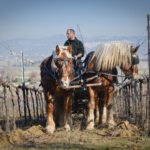
Food isn’t the only place where labels are touting “organic,” “sustainable,” and “natural” with increasing regularity. The growing methods have become so popular with wine drinkers that it is not uncommon to find stores specifically dedicated to sustainable or natural wines. And this trend isn’t limited to the U.S., it’s changing the wine industry worldwide on both the grower and consumer side. But what do all of the terms mean, and do they ultimately affect the taste of the wine at all?
First things first, all of these labels are referring in some way to production methods. Though wine production may seem bucolic and unmediated once you have your grapes in a row, it isn’t. Vineyards need a lot of attention in order to produce the best wine possible, and for many, that means a lot of chemical intervention. In fact, France, the nucleus of the world’s wine industry, is the third-largest consumer of pesticides in the world, and at least one study found that 90% of their wine samples contained pesticides. That aside, it is completely logical for a person who is already buying organic or “natural” food to seek out the same when choosing their wines.
 ‘Sustainable’ can mean a range of things, from utilizing organic or biodynamic growing methods to offsetting a vineyard’s energy needs. Of these labels, only ‘organic’ is regulated. The USDA sets the regulations on all organic products sold in America, whether they are produced at home or abroad. When you see the USDA Organic symbol on a bottle of wine, it means that vineyard has been certified to grown the grapes “without synthetic fertilizers and in a manner that protects the environment and preserves the soil.” Additionally, sulfites cannot be added to stop the fermentation process. But wines made only with “organically grown grapes” may have added sulfites.
‘Sustainable’ can mean a range of things, from utilizing organic or biodynamic growing methods to offsetting a vineyard’s energy needs. Of these labels, only ‘organic’ is regulated. The USDA sets the regulations on all organic products sold in America, whether they are produced at home or abroad. When you see the USDA Organic symbol on a bottle of wine, it means that vineyard has been certified to grown the grapes “without synthetic fertilizers and in a manner that protects the environment and preserves the soil.” Additionally, sulfites cannot be added to stop the fermentation process. But wines made only with “organically grown grapes” may have added sulfites.
A popular sustainable alternative is biodynamic, sometimes referred to as ‘organic+’. Biodynamic farming is based off of the teachings of Rudolf Steiner who believed that you have to treat the whole farm as its own ecosystem, including taking into account lunar cycles. Like with organic farming, the grapes are supposed to be grown without synthetic chemicals. There is third-party certification available, the largest organization being Demeter International.

‘Natural’ wines are the ne plus ultra of these “alternative” techniques. With natural wine, a term that is unregulated and uncertified, makers aim to create wines as unadulterated as possible. This can mean not adding yeasts to produce certain flavors; no or low amounts of sulfur dioxide to preserve the finished product; no filtering of sediments; or clarifying. The sometimes tangy, sometimes yeasty, sometimes cloudy character of natural wine is the appeal. The wine itself is still “alive” right up until when you drink it, and some believe that depending entirely on the grapes and the natural yeast means you are getting the most genuine version of a wine terroir.
Now, does it affect the taste? A UCLA study says it does. Eco-certified wines score higher on 100-point scales when reviewed by wine professionals. As for natural wine, if you’re into the current fermented trend—if kombucha and kimchi are regulars in your fridge already—you should make the leap. Trust us, you’ll like it.



